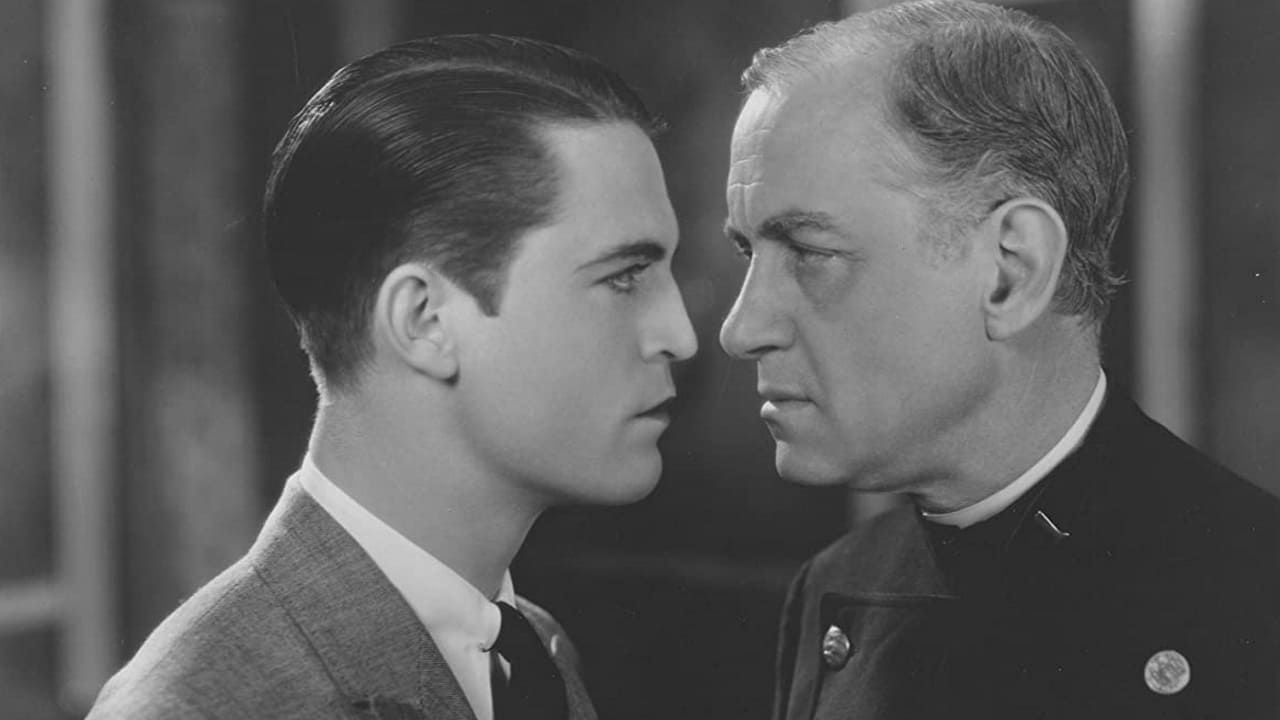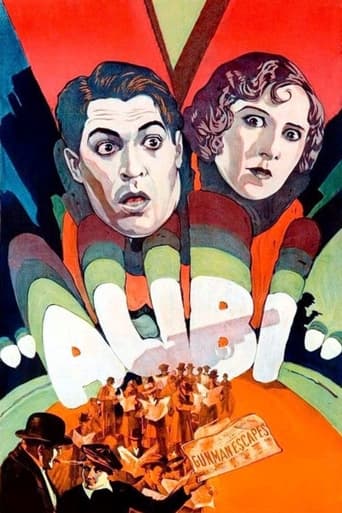

Great visuals, story delivers no surprises
... View MoreI am only giving this movie a 1 for the great cast, though I can't imagine what any of them were thinking. This movie was horrible
... View MoreA terrific literary drama and character piece that shows how the process of creating art can be seen differently by those doing it and those looking at it from the outside.
... View MoreThe joyful confection is coated in a sparkly gloss, bright enough to gleam from the darkest, most cynical corners.
... View MoreDire. When the first scene of the movie is a tracking shot to a line of chorus girls and eventually focuses on the most inept dancer you have ever seen, you know it's downhill from here. This talentless, ham-fisted, frumpy cow actually has a supporting role, which sets the bar very low for everyone else. However, they still manage to demolish any semblance of good acting. Chester Morris, who plays the gangster, is horrendous. As cardboard as the stage sets, he alternates between smugness and a perpetual scowl for most of the movie. At the end when his alibi is disproven, his personality completely changes unbelievably and he turns into a whimpering sap. The scene where he thinks he has been shot by the police and collapses on the floor is hysterical, as well as his actual death scene. On the topic of death scenes, a shout out has to go to Regis Toomey. Irritating throughout, his death scene has to be the longest ever put to film that I ended up shouting, "just die, already!" at him.The story itself may have been interesting for an easily-entertained 1929 audience, but with so many coincidences and implausible moments, as well as being boring, clichéd and dull, I was wishing this 91 minute masterpiece of crap was only 91 seconds long. This was nominated for Best Picture and Best Actor for Chester Morris. I despair.
... View More"Alibi" was a sensational talkie debut for Chester Morris who played Chick Williams, the first of the anti heroes who were to dominate Hollywood in the 1930s. Chester Morris was first noticed in the Broadway cast of "Crime" - in fact the whole cast was raided for the movies - Sylvia Sidney, Douglass Montgomery, Kay Johnson, James Rennie, Jack La Rue and Kay Francis, a cast Broadway producers nowadays could only dream about. The role of amoral Chick Williams bought him instant recognition and an Academy Award nomination and even though he lost to Warner Baxter for "In Old Arizona" (Chester should have won) studios were riveted to his performance and during 1929 Paramount, Warner Brothers/First National and RKO used him constantly. Even though Roland West produced, directed and wrote the screenplay for this trail blazing talkie, based on the Broadway play "Nightstick", his career faded soon after when he retired and went into the restaurant business with his current girlfriend Thelma Todd.Joan (Eleanor Griffith) is going out with recently released prisoner Chick Williams (Morris), she is a policeman's (Purnell Pratt) daughter who feels he only needs the love and support of a good woman to help him go straight. But behind Chick's pleasant exterior is a hardened criminal who is really the brains behind the gang who welcome him back to the fold. Another fixture at the almost futuristic nightclub (shades of "Broadway") is amiable drunk Danny (Regis Toomey) who has his eye on cute singer Toots but when Joan walks into her apartment one night she finds Danny with her father and realises he is a plain clothes policeman. They are trying to get the robbers of a fur heist in which a policeman was killed - they are convinced Chick was responsible. Even though she could betray Danny she doesn't, but she also has a bombshell of her own to drop - she is now married to Chick and can furnish him with an alibi for the night of the murder.Although Morris didn't have much to do during the first half of the movie once Chick's true colours are revealed he dominates every scene. There was a trifle bit of over acting and grimacing but for his first talkie he handled himself like a veteran. For an early talkie (April 1929) there was a lot of innovation and while a couple of things didn't come off the rest did - in the interrogation room as a prisoner is broken down into confessing to his part in the robbery, through having his face directly at the audience, they see his expressions and know he is guilty before the cops do. It may have been lifted from the stage production but it worked. The German expressionistic vogue hadn't entirely faded away and the Art Deco sets and lighting were used to great advantage, especially the chase sequence up on the roof top.Because 1929 was the height of the musical boom, action was often stopped for a musical number (they slowed the film down a bit). It even boasted a hit song "I"ve Never Seen a Smile Like Yours" sung by Irma Harrison (dubbed by Virginia Flohri, as reported in a Photoplay expose about dubbing in 1929). Harrison was cute but didn't make much of an impression, the same can be said of Eleanor Griffith who only made "Alibi" and another film back in 1922, but she did make an impression on movie suavey John Halliday whom she married in 1929.
... View MoreThe ugliness of the early sound era is on parade in Alibi, a cops and robbers yawn that features both figuratively and literally a lot of bad actors. Sound was new territory for cast and crew and it shows both in the direction of Roland West and his cast who clearly needed a lot more rehearsal time as they endlessly pause between sentences an attempt to convey menace by locked in mug like facial expressions. West shows no grasp of pacing as he dissembles nearly every taut moment in the film with pregnant pauses followed by bad inflection from his actors who on occasion seem to be winging it on their own. Only Chester Morris leading with his Dick Tracy chin offers some convincing moments while the rest of the cast seems content just to have their voice picked up by the microphone. West meanwhile allows scenes to linger and linger to a point where you swear you can here crickets chirping. A glowing example can be found in undercover cop Regis Toomey's three minute dying scene that has to be endured to be believed. Was West incapable of saying the word cut?There are some fine rooftop scenes of dramatic silhouette and neon and interiors that feature some eye popping and audacious art deco design that may well have carried the day if it were a silent. But in the infancy of sound these growing pains make Alibi one big one to watch.
... View MoreThe acting is mainly from the silent film era, but the fact that it is a sound film actually makes it quite interesting. The film is pre-Hayes Code and is startling in its violence. I don't think it was until 1937 and "Petrified Forest" (Humphrey Bogart) and 1951 "White Heat" (James Cagney)that such a psychopathic criminal was on screen. I don't think it was until 1970 and "Dirty Harry" (Clint Eastwood) that such a anger-filled cop was shown. The way the police are shown threatening to shoot a suspect and make it look like an attempted escape, really makes one see the need for Miranda Rights for suspects, something that didn't exist in 1929.The lead performances by Regis Toomey and Chester Morris are memorable. This was Morris' first starring role and he went on to star in nearly 50 films over the next 10 years. In the 1940's he starred 14 times in the detective movie series "Boston Blackie". He did around 45 television shows in the 1950's and 60's.This was Regis Toomey's first movie. He went on to star in some 25 movies over the next 5 years, before becoming one of Hollywood's most dependable supporting character actors in some 150 more films into the 1950's, often playing police detectives. He was in such classics as "His Girl Friday," "Meet John Doe," "Spellbound," and "Mighty Joe Young." He went on to appear on over 100 television shows from the 1950's to the 1980's. He costarred with Gene Barry in "Burke's Law" for three years in the 1960's.Director Roland West did just two more films the following years starring Morris, "the Bat Whispers" and "Corsair." Unfortunately, he apparently became involved with real life gangsters and was involved in the tragic death of actress Thelma Todd, which abruptly ended his career. He shows a nice unique style here, with sequences of fluid camera movement inter-cut with quite static shots, a little like James Whale. It is quite similar to the other movies I have seen by him "The Bat" and "The Bat Whispers". If he had continued with films, he might be considered a great auteur today.This is a must see for cinema buffs and especially lovers of gangster films.
... View More